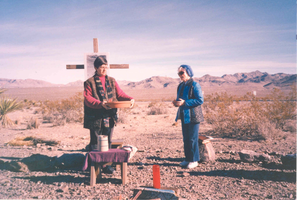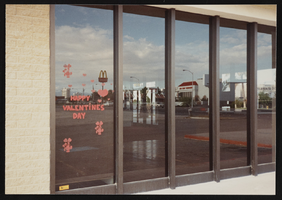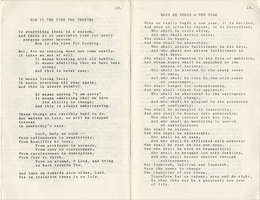Search the Special Collections and Archives Portal
Search Results
Carole Fisher oral history interview
Identifier
Abstract
Oral history interview with Carole Fisher conducted by Barbara Tabach on December 14, 2016 for the Southern Nevada Jewish Heritage Project. In this interview, Fisher discusses her family background and moving to Las Vegas, Nevada in 1979. Fisher talks about Nathan Adelson Hospice, programs that they provide for the Las Vegas senior community, and the increase of hospices in Las Vegas. She describes how Nathan Adelson Hospice is able to provide care for uninsured people, fundraising events they organize, and how their hospice differs from traditional hospital care. Lastly, Fisher discusses the significance of death in the Jewish religion.
Archival Collection

Sister Rosemary Lynch and an unidentified protestor on Ash Wednesday: photographic print
Date
Archival Collection
Description
Image

The Evangelism Training Center: photographic prints
Date
Archival Collection
Description
Image
Charlotte Brascia oral history interview
Identifier
Abstract
Oral history interview with Charlotte Brascia conducted by Joe Mascellino on February 24, 1977 for the Ralph Roske Oral History Project on Early Las Vegas. Mascellino asks Brascia about social and cultural changes, the growth of different religions, Brascia’s brief presence in the airline industry, political presence in Las Vegas, Nevada, and rising crime rates. Brascia also specifically discusses her experience in the gaming and hospitality industry and how gaming operations have changed over time, particularly comparing gaming and hiring practices in the 1950s with those in the 1970s.
Archival Collection
Robert N. Broadbent oral history interview
Identifier
Abstract
Oral history interview with Robert N. Broadbent conducted by Connie Lyons on September 23, 1972 for the Ralph Roske Oral History Project on Early Las Vegas. During the interview Broadbent discusses education, politics, religion, entertainment, the dedication of Hoover Dam, and the various social clubs of which he is a member of. Broadbent also discusses Six Companies, housing in Boulder City, Nevada, the Las Vegas Strip, Railroad Pass, the Union Pacific Railroad, and the above ground atomic bomb testing in Nevada.
Archival Collection

Jewish Federation correspondence, meeting minutes, and other records, item 05
Description
A letter about local allocations from Hal Ober to the Board of Directors of the Jewish Federation of Las Vegas, Nevada. May 20, 1986.

Prayer supplement for High Holy Days at Temple Beth Sholom, 1974
Date
Archival Collection
Description
The booklet includes meditations on faith, prayer, forgiveness and remembrance.
Text
Tyrone L. Seals oral history interviews
Identifier
Abstract
Oral history interviews with Tyrone L. Seals conducted by Claytee D. White and Sarah Beth Hawkins on April 25, 2016 and May 16, 2016 for the African Americans in Las Vegas: a Collaborative Oral History Project. In the first interview, Seals discusses his upbringing in Las Vegas, Nevada and growing up in the Westside. He talks about experiencing discrimination, employment limitations, and entertainment on Jackson Street. In the second interview, Seals remembers school integration, organizations for African American women, and protests during the 1960s. Lastly, Seals discusses the significance of religion in the African American community and becoming a pastor.
Archival Collection
Maria Banks oral history interview
Identifier
Abstract
Oral history interview with Maria Banks conducted by Barbara Hoyt on September 23, 1972 for the Ralph Roske Oral History Project on Early Las Vegas. Banks discusses her experiences managing a jukebox company, owning and operating two restaurants, and working for a music company. She also discusses her Mormon religion and the relationship she had with her late husband. Banks also discusses the change in climate over time, specifically the increasing humidity.
Archival Collection

